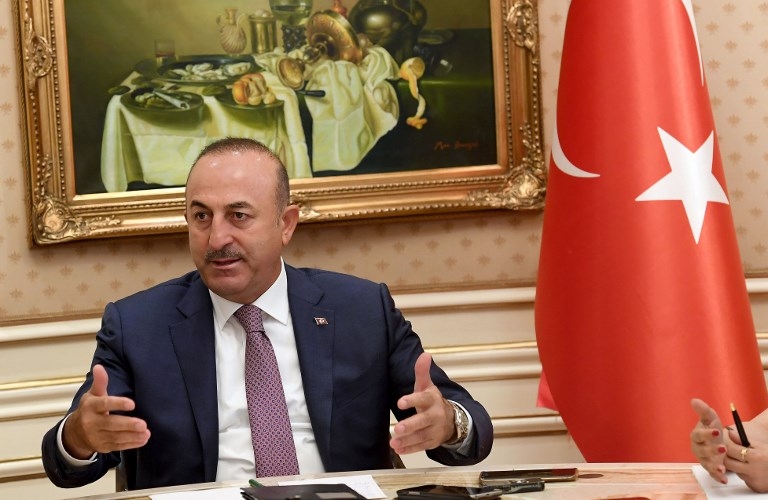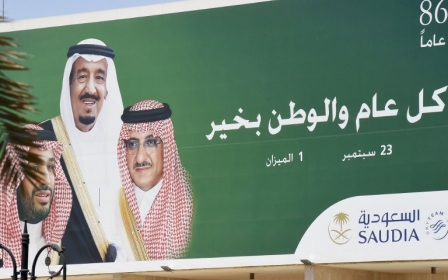Saudi Arabia working on list of Qatar 'grievances' as Turkey FM arrives in Jeddah

Saudi Arabia's foreign minister said on Friday that a list of grievances involving Qatar was being drawn up and would be made public soon.
The minister, Adel al-Jubeir, said Qatar should respond to demands to halt its support for "extremism and terrorism" which, he said, were being made by the whole world and not just Gulf states.
It is a list of grievances that need to be addressed and that the Qataris need to fix
- Adel al-Jubeir, Saudi foreign minister
Four Arab states - Saudi Arabia, the UAE, Bahrain and Egypt - severed diplomatic relations with Qatar on 5 June, accusing it of supporting militants and Iran - charges that Doha has denied. The UAE has also decided to blacklist Qatari individuals and entities.
Speaking to journalists in London, Jubeir said: "I would not call them demands. I would say it is a list of grievances that need to be addressed and that the Qataris need to fix.
"We are working on those with our Bahraini, Emirati and Egyptian partners in order to compile this list and present it to the Qataris, and I think it will be done fairly soon."
Calling Doha an "ally" in the six-nation Gulf Cooperation Council (GCC), Jubeir said there was no intention of harming the Qatari people.
"Enough is enough, and our Qatari brothers cannot continue to fund extremism and terrorise and incite and use hostile media and interfere with the affairs of other countries and still remain in good standing," he said, adding he expected a positive response to the demands from Doha that would move the region to a "better place".
Jubeir did not detail what demands could be made.
Cavusoglu lands in Jeddah
Turkish Foreign Minister Mevlut Cavusoglu arrived in Saudi Arabia on Friday for talks with King Salman, continuing efforts to resolve the Gulf's biggest diplomatic crisis in years.
A Turkish diplomatic source told AFP that the minister had landed in Jeddah.
Riyadh, the UAE, Egypt and others severed diplomatic and economic ties with Qatar almost two weeks ago, accusing Doha of supporting groups, including some backed by Iran, "that aim to destabilise the region".
Qatar denies any such support for extremists.
The emir of Kuwait, which did not cut ties with Qatar, has also been trying to mediate.
Turkey's chief diplomat was in Doha on Wednesday where he called for dialogue after meeting Qatar's emir and foreign minister ahead of his Saudi stop.
"Although the kingdom is a party in this crisis, we know that King Salman is a party in resolving it," Cavusoglu said earlier.
Although the kingdom is a party in this crisis, we know that King Salman is a party in resolving it
- Mevlut Cavusoglu, Turkish foreign minister
"We want to hear the views of Saudi Arabia regarding possible solutions and will share with them our views in a transparent way... We pay a great attention to our relations with them," he said.
The crisis has put Turkey in a delicate position as Ankara regards Qatar as its chief ally in the Gulf but is also keen to maintain its improving ties with regional power Saudi Arabia.
At the same time, Turkey is eager to maintain workable relations with Iran, Saudi Arabia's foe.
Turkish President Recep Tayyip Erdogan on Tuesday described the decision by Gulf states to cut political and economic ties with Qatar as "inhumane and un-Islamic".
He stopped short of directly criticising Saudi Arabia and said that as "the elder statesman of the Gulf," Salman should resolve the matter.
Among the punitive measures imposed by Riyadh and its allies, Qatar Airways is banned from the airspace of its neighbours, Gulf states gave Qataris 14 days to get out, and Saudi closed its land border through which much of Qatar's food supply crossed.
The Gulf crisis prompted US Secretary of State Rex Tillerson to announce on Friday that he was cancelling his planned trip next week to attend an Organization of American States meeting in Mexico to instead remain in Washington to work on reducing diplomatic strains.
Tillerson "will continue his efforts to de-escalate tensions in the Middle East region through in-person meetings and phone conversations with Gulf and regional leaders," the US State Department said in a statement.
Middle East Eye propose une couverture et une analyse indépendantes et incomparables du Moyen-Orient, de l’Afrique du Nord et d’autres régions du monde. Pour en savoir plus sur la reprise de ce contenu et les frais qui s’appliquent, veuillez remplir ce formulaire [en anglais]. Pour en savoir plus sur MEE, cliquez ici [en anglais].



